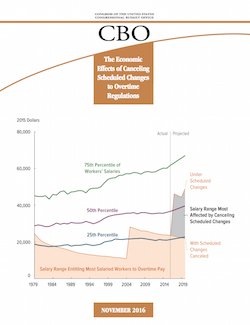
Canceling changes to overtime regulations that are set to go into effect Dec. 1 would reduce private-sector employers’ payrolls and compliance costs and would increase profits, according to an analysis released Monday by the Congressional Budget Office.
Payroll costs would be cut by $40 million in December and by $470 million in 2017, the CBO said.
The rule, finalized in May by the Labor Department, doubles the salary threshold — from $23,660 to $47,476 per year — under which most salaried workers will be guaranteed overtime pay when they work more than 40 hours per week, and that threshold will be updated automatically every three years.
Under the changes, the CBO said, 3.9 million additional workers not currently eligible for overtime under federal law will become eligible. Of them, about 900,000 regularly or occasionally work overtime and therefore would have their overtime pay affected if the final rule were to be canceled, according to the report. A cancellation would reduce total earnings in the economy by $50 million in December and by $510 million in 2017, the CBO estimated.
Although cancellation of the rule would decrease pay for employees, it would result in an increase in real family income (income adjusted for inflation) because an increase in companies’ profits and a decrease in prices would “more than offset” the reduction in some workers’ earnings, according to the report.
Even if the rule is canceled, however, employers would not be able to recover the costs they already have incurred to familiarize themselves with the rule and to adjust to the scheduled changes, the CBO noted.
The American Health Care Association and National Center for Assisted Living, the American Seniors Housing Association, Argentum and LeadingAge all have expressed concerns about the rule and the effects it will have on senior living operators.
Editor’s note: Nov. 15, the Labor Department posted a blog responding to the CBO report. Titled “CBO Report Confirms What We Already Knew,” the department said that reversing the overtime rule would take overtime protections away from 4 million workers, reduce workers’ earnings while increasing the hours they work and primarily benefit people with high incomes, among other effects. Read the blog here.



